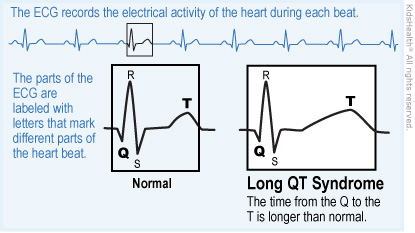Your child has been diagnosed with long QT syndrome. This condition affects the electrical system of the heart, and can lead to a dangerous heart rhythm. The QT interval is measured on an electrocardiogram (EKG or ECG), which is a recording of the electrical activity of the heart.
Some kids with long QT syndrome have no symptoms. Others may feel changes in their heartbeat or feel lightheaded (like they're going to faint) at times. To help your child stay safe and healthy, follow the cardiologist's advice about medicines, diet, and exercise.



Your child:

Your child:
Tell the emergency medical team that your child has long QT syndrome. If your child can't be awakened, begin CPR and use an AED, if available.

How is long QT syndrome diagnosed? Doctors will:
How is long QT syndrome treated? Many patients with LQTS take a medicine called a beta blocker. Beta blockers help the heart beat more slowly. They can sometimes cause lightheadedness or make it worse, and can make some people more tired than usual.
What causes long QT syndrome? Often, long QT syndrome is inherited, meaning parents can pass it to their children. Other times, doctors don't know why it happens. Your cardiologist may ask that other family members get genetic testing.
What happens if someone has a dangerous heart rhythm even when following the cardiologist's advice? Some kids have to get a small device called a defibrillator implanted under their skin. If a child has a dangerous heart rhythm, the device can reset the heart to a normal rhythm.
Can children with long QT play sports? Some kids can fully participate in sports, but only under the careful guidance of their cardiologist.